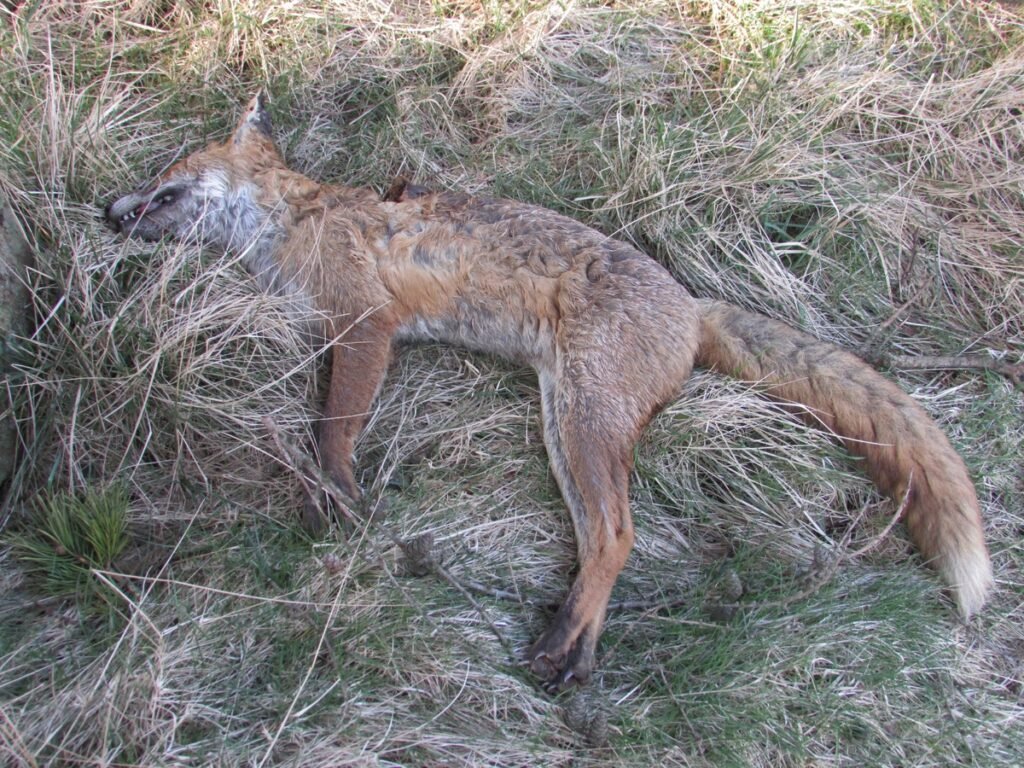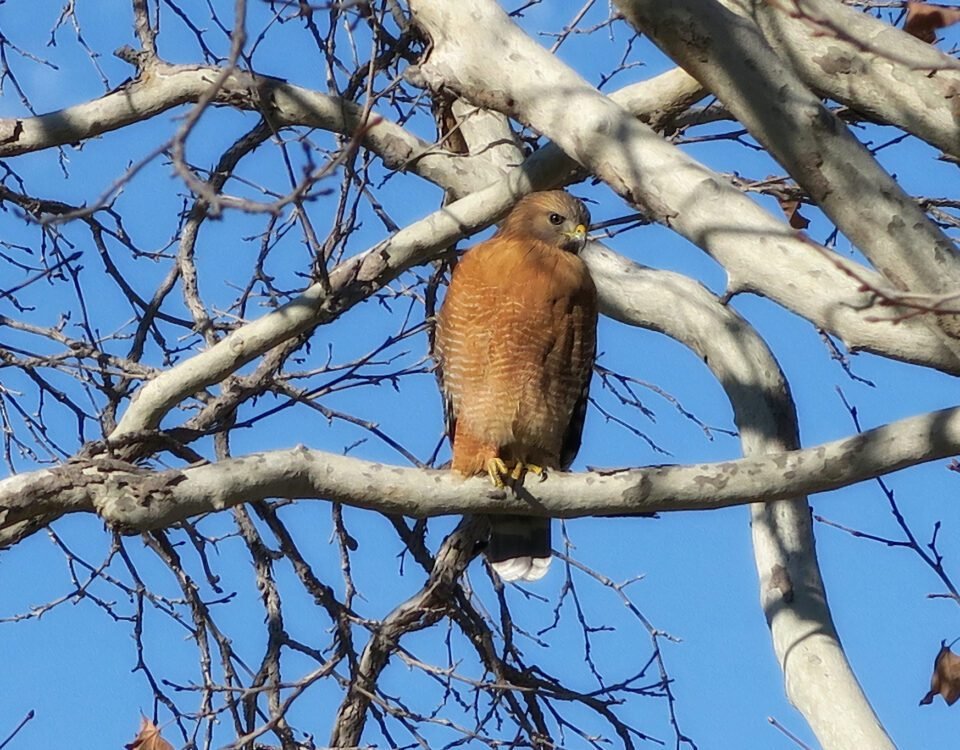


Do Owls Attack & Eat Foxes? Facts & Questions Answered
October 21, 2023


How Fast Do Baby Birds Grow? Timeline Explained
October 21, 2023Hawks are truly impressive and dominant birds in the skies. Their sharp vision, keen hearing, exceptional hunting prowess, and swift flying capabilities make them experts at preying on smaller birds and animals. But can they target larger prey, such as foxes? Do hawks have foxes on their menu?
Yes, hawks might occasionally prey on foxes. While most of their diet consists of small rodents, they won’t pass up the opportunity to seize a fox if presented with one. However, hawks typically focus on the young or the wounded when targeting foxes, as they pose a less challenging catch.
Let’s explore more profoundly how hawks eat big prey and how often they do that.
Related Read: Pros and cons of having a hawk in your backyard [2024 Updated]
Do Hawks Eat Foxes And When?
Hawks hunt a diverse range of animals and are at a top position in the food chain. Their status as some of the most skilled predators in the wild is undisputed. While foxes aren’t their primary prey, hawks have been known to hunt and consume them occasionally.
Let’s explore the circumstances under which hawks might take the opportunity to hunt and feast on a fox.
Fox Cubs
Typically, a vixen births between 3-5 cubs at a time. These newborns weigh 50-150 grams and are mainly immobile, blind, and deaf in their initial two weeks. During this period, the mother fox seldom leaves them unattended.


Red Fox Cubs
If hawks spot these vulnerable cubs alone, they won’t hesitate to dive, snatch them, and climb rapidly.
As the cubs reach the 3-month, they begin venturing to hunt alongside their parents. This is when many fall prey to various predators, including hawks, eagles, coyotes, and more.
Recommended Read: 15 Human Foods That Birds Can Eat [Latest Guide 2023]
Injured Foxes
At times, foxes confront challenging predators such as lions, leopards, and bears. These encounters might lead to grave injuries or even death.
Most predators are opportunistic and target injured animals since they offer an easier hunt. Recognizing an injured fox’s vulnerability, hawks may seize the chance to feed on it.
Weak Foxes
In the unforgiving world of wildlife, only the fittest prevail. Elderly or weak foxes often become easy targets for predators. Larger species of hawks can prey on these weakened foxes, like the ferruginous or red-tailed hawks.
Dead Foxes
It’s well-known that hawks can also act as scavengers. They will likely participate in this unexpected feast if they encounter any remains of a dead fox. Especially during the colder months, it’s not uncommon to see hawks feeding on the remains of deceased animals due to the scarcity of live prey.


Dead Fox
After a predator has had its fill, hawks can be observed roosting nearby, patiently waiting for their turn. Once the initial predator departs, the hawks descend to scrape for any remnants. Whether it’s a fox or another creature, they’ll gladly consume whatever is left behind.
Editor’s Pick: Can Dogs Eat Birds? Is It Safe & What To Know!
How Do Hawks Kill Foxes?
Their aerial perspective gives hawks a distinct advantage when targeting terrestrial mammals.
- Often soaring high in the sky or perched atop towering trees, hawks vigilantly scan the ground below for potential prey.
- When they identify a fox, they employ the force of gravity to swoop down at remarkable speeds. It’s often too late to dodge when the fox senses the impending danger from above.
- Upon seizing the fox, hawks use their robust, razor-sharp talons, and occasionally their beaks, to suppress their catch.
- They frequently target the eyes initially, being the most vulnerable area, and then proceed to hinder by striking the fox’s head.
- Once the fox is defeated, the hawk transports it to its nesting site for a hearty meal.
How frequently do hawks prey on foxes?
There’s a general belief that hawks predominantly feed on mice. However, the truth is that their diet primarily comprises small rodents and birds.
Research conducted in New York State revealed that for red-tailed hawks, meadow voles are their most frequent prey, followed by cottontail rabbits and gray squirrels. Other investigations have highlighted that hawks might feast on animals like chipmunks, sparrows, and robins.


Hawks Claws
From this information, it’s evident that foxes don’t rank high on the preferred menu for hawks. They don’t target foxes regularly. That said, hawks are adaptable predators that adjust their diet based on available opportunities. In the context of foxes, birds of prey are more inclined to target the young or the wounded.
Which Hawks Eat Foxes?
While hawks are skilled and versatile predators, only the larger species can take on foxes, and even then, it’s usually young injured, or weak foxes. The two hawk species that might potentially target foxes include:
- Red-tailed Hawk (Buteo jamaicensis): This is one of the most prominent hawks found in North America. While their primary diet consists of small mammals and birds, a particularly large and strong individual might attempt to prey on a fox cub or a weakened adult fox in opportunistic situations.
- Ferruginous Hawk (Buteo regalis): As the largest hawk species in North America, the ferruginous hawk has the size and strength to target larger prey. Still, even for this species, a fox would be an unusual and challenging prey item.
Also, Read: What To Do When Your Bird Bites You? A Complete Guide
How do foxes Defend Hawk attacks?
Fox cubs are particularly vulnerable to threats from predators, including hawks. For this reason, they often remain within or close to their dens until they are around five weeks old. Adult foxes play a protective role during this period, safeguarding the young ones until they are old enough to venture further out.


Red Fox
Foxes are renowned for their keen intelligence and wittiness. They maintain a constant alertness to their environment. If they detect the incoming threat of a hawk overhead, their first line of defense is to use their swiftness and skill to evade the predator.
In situations where evasion isn’t an option and a hawk closes in on them, foxes will rely on their sharp claws and teeth as defensive tools.
To further enhance their safety, foxes strategically choose grasslands as their habitat, making intricate caves and dens. These subterranean homes offer a haven from aerial threats like hawks.
Must Read: Why Are Birds So Loud in the Morning and Evening? A Guide
Do Foxes Prey On Hawks?
While hawks typically have a limited number of natural enemies, a few creatures threaten them. These include the great horned owls, raccoons, larger eagles, and even other hawks. Surprisingly, foxes also make this list.
Indeed, foxes have been known to prey on hawks, but not the fully-grown ones. Instead, they typically focus on the vulnerable: hawk chicks and eggs.


Do Foxes Prey On Hawks?
Foxes often track hawks to discover the location of their nests. They patiently wait for moments when the adult hawks leave their nest searching for food, leaving the eggs or fledglings unprotected.
Seizing such opportunities, foxes raid the nests, feeding on the hawk eggs or the young ones.
Additionally, fledgling hawks, especially those in the early stages of mastering flight, can become easy prey for foxes. These young birds, often flying at lower altitudes and displaying inexperience, fall within the grasp of opportunistic foxes.
Read Next: Why Do Birds Get Aggressive? What You Need to Know?
Final Thoughts
Many have wondered whether hawks prey on foxes. Renowned for their hunting prowess, hawks have an extensive menu of potential prey. While foxes are indeed within their capabilities, targeting them is less frequent than pursuing other typical prey species.



